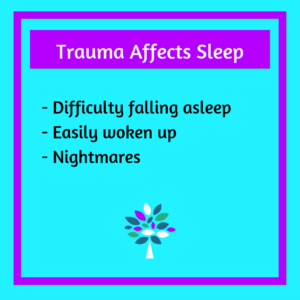Trauma Alters Sleep

Trauma can affect sleep in a few different ways. It may be more difficult to fall asleep due to fears and anxieties and a general cognitive preoccupation with worried thoughts. Because of a general hyper-arousal of the nervous system it can be difficult to remain asleep as you may be easily awoken by sounds which are interpreted by your brain as a possible sign of threat. Often the person then feels the need to get up and make sure there is no actual danger. Waking up this way then makes it difficult to calm the system back down to go to sleep. In general good sleep hygiene and anxiety management strategies can help here, as can having an animal as they tend to be good barometer of whether or not there is actually something to be on alert about.
Finally, nightmares are a common occurrence for those with traumatic experiences. These nightmares can be a reliving of the trauma experience(s), or may be more symbolic in nature. For example, there may be themes of being chased or harmed. There is a medication that can help manage the nightmares associated with PTSD, Prazosin.
After a single trauma, these are common disruptions to sleep and a part of the process of working through the experience and tend to subside after a few months. However, when there is chronic traumatization or the brain gets stuck in working through the trauma, then these symptoms tend to stick around and that is when professional help can be useful to reduce or eliminate these symptoms. Trauma work is my passion and if you want to learn more about me and my practice, check out the links in my bio. You do not need to keep suffering, help is out there.










